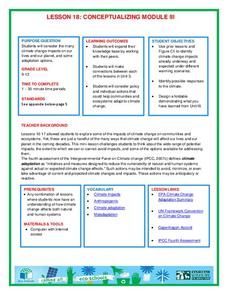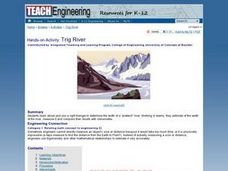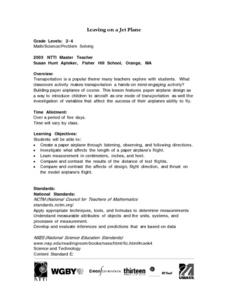Curated OER
What is the Average Height of Your Class?
In this statistics lesson, learners use an on-line form generator create a class-specific form, then complete the form, view a graph and data analysis, and draw conclusions.
NASA
Rain Gauge Activity
Complete teacher narrative and presentation slides for teaching about Earth's water make up the bulk of this lesson. Embedded within the slide show, you will find videos about the water cycle, keeping track of the limited supply of fresh...
Institute of Electrical and Electronics Engineers
Get Connected with Ohm's Law
Ideal for your electricity unit, especially with middle schoolers, this lesson plan gets engineers using multimeters in electrical circuits to explore the relationships among voltage, current, and resistance. Older learners may even plot...
National Wildlife Federation
Conceptualizing Module III
Many researchers focus on one impact of climate change in isolation, but researchers gain a global perspective when they come together. A timely lesson teaches scholars about the projected impacts of global temperature increases. Then...
Institute of Electrical and Electronics Engineers
Exploring at the Nanoscale
Nano-nano! Nanotechnology can seem like it's from another planet! After learning about this tiny technology, collaborative groups experiment with how smaller particles affect chemical reactions. They do this by immersing a whole and a...
Curated OER
"How Big is a Foot?" by Rolf Myller
Students use estimation and fractions and standard units of measure to measure foot strips.
Curated OER
Swimmy's Friends
Students solve problems using various strategies. In this problem solving instructional activity, students read the book Swimmy by Leo Lionni. Students make fish swimming patterns, measure how many goldfish crackers it takes to make a...
Curated OER
Up For Change?
Students explore similar objects. They participate in a series of hands-on, multimedia and online activities to examine how the edge length affects the angle measures, perimeters and areas of similar regular polygons. Students find the...
Curated OER
What a Drag
Students learn examples of friction and drag, and suggest ways to reduce the impact of these forces. The equation that governs common frictional forces is introduced, and during a hands-on activity, students experimentally measure a...
Curated OER
To The Clock of Eras
Third graders investigate the events of geological time using a chart called a "Clock of Eras". In this geological events lesson plan, 3rd graders compare a standard clock to a geological clock. In addition, students consider periods...
Curated OER
The North (Wall) Star
Students engage in a instructional activity which shows them that celestial navigation is the art and science of finding one's geographic position by means of astronomical observations, particularly by measuring altitudes of celestial...
Curated OER
TE Activity: The Beat Goes On
Students determine what the pulse is before examining how to measure the heart rate in different situations. They build a simple device that measures the heart rate, take heart rates, and record them on a worksheet. They discuss how...
Curated OER
Trig River
Students calcute distances using trigonometry and angle measurements. They estimate the width of the Trig River, measure it and compare their results with their classmates. They collaborate with a group to research and find the results.
Curated OER
Warming by Freezing
Ninth graders discover the reasoning behind spraying water on fruit and seedlings in preparation for hard freezes. In this conceptual physics lesson, 9th graders conduct an experiment to measure the heat released when water goes from a...
Curated OER
Area: It's What's on the INSIDE That Counts!
Second graders participate in a series of hands-on, online and multimedia activities that examine the concept of area. They view clips from the animated series Math Monsters and discuss the purpose of area and how it is used in the real...
Curated OER
By the Pound, Gram Liter or Gallon
Students participate in experiments at five stations to practice measurement. In this measuring lesson, students are presented different produce and objects and must measure with an appropriate tool. Students use metric and customary...
Curated OER
Earthquakes Rock!
Young scholars study the main methods to measure earthquakes; the Richter Scale and Mercalli Scale. They make a model of a seismograph and investigate which structural designs are most likely to survive an earthquake.
Curated OER
Environment: Wild Wind Direction
Students examine the different types of wind patterns. Using common materials, they construct weather vanes to measure and record wind direction over a two-week period. After analyzing the data, they draw conclusions about the...
Curated OER
Harnessing Wind
Students explore the ways that engineers study and harness the wind. They study the different kinds of winds and how to measure wind direction. In addition, students learn how air pressure creates winds and how engineers build and test...
Curated OER
How Do Things Fall?
Students study forces by examining the force of gravitational attraction. They observe how objects fall and measure the force of gravitational attraction upon objects. Students discover that, since gravitational constants are different...
Curated OER
Wind Power
Fourth graders develop an understanding of how engineers use wind to generate electricity. They will build a model anemometer to better understand and measure wind speed. They discover that engineers design wind turbines that generate...
Curated OER
Leaving on A Jet Plane
Students create an airplane by listening to directions. They also to measure the pieces for the airplane and compare and contrast their test flights.
Curated OER
Close Enough?
Students examine how navigation is based on mathematics and how making a mistake in measuring an angle could have an impact on a target. They observe a teacher-led lecture, use a calculator to complete two worksheets, and participate in...
Curated OER
Topo Triangulation
Students investigate how to read a topographical map and triangulate with just a map. They convert a compass measurement to a protractor measurement, reverse a bearing direction, and using a worksheet take a bearing of certain landmarks...























